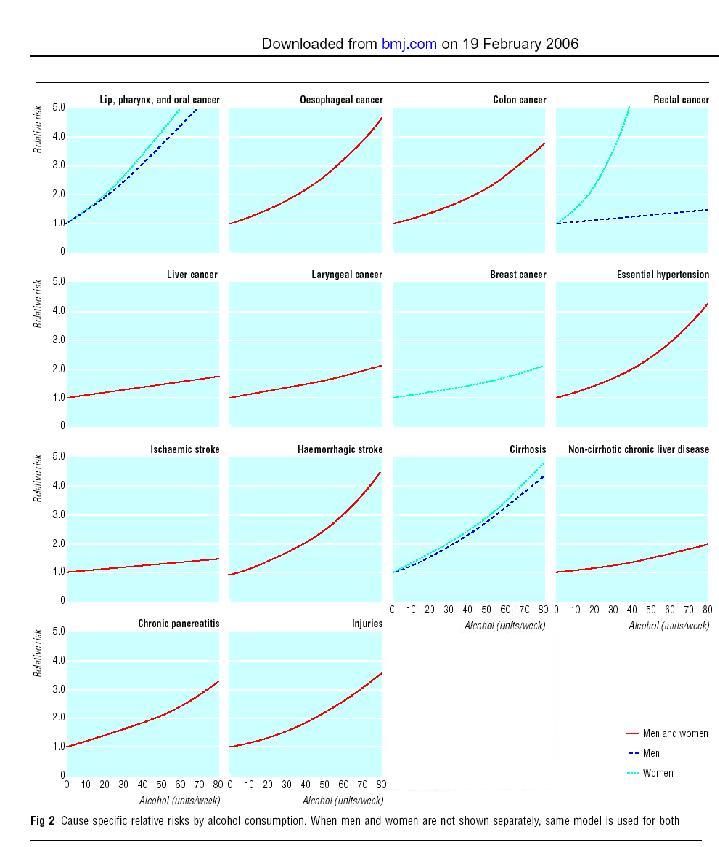|
STUDY:
Alcohol consumption, age Both sexes Male
Female
2000
2000
2000
Percent current drinkers
18-34years ........................ 69.0
76.0 62.0
35-44 years ........................
59.7
66.5 52.8
45-54 years ........................
56.3
63.5 49.5
55-64 years ........................
46.9
53.5
40.0
65-75 years ........................
42.9
50.0
35.7
75+ years
........................ 28.1
35.1
21.1
Fact: Alcohol takes off an average of 8-11 years off a
light drinker, 12-14 years off a moderate drinker and 15+ years off
a heavy drinker. These
stats do not lie. That
means every drink takes off a little more than 1 and Ĺ days of your
life on average, which means 4 drinks takes off one week of your
life and most people do that in one sitting. So if you drink on a fri and
sat night, 4 drinks, for just two weekends, you lose a month off
your life if not more.
But nothing beats the fact and statistic that at age 25, 30%
of the population at that age has been a lifetime abstainer from and
70% have drank, but by the age group of 75 and older, 69% of the
population doesnít drink and only 8% of the these people had quit
between the ages of 25 and 75, so that means 61% of the population
now are lifetime abstainers.
The percentage of the population of lifetime abstainers of
alcohol within age groups 25-44 then to 45-54, 55-64, 65-74 and 75
and older increase rapidly because drinkers die off so much more
quickly than non-drinkers. So at age 25, 6 out of
20 people have never drank in their life and 14 out of 20 have. At age 75, only one of these
6 lifetime abstainers will have died and 11 out of the 14 drinkers
will have died because that would make 5 lifetime abstainers and 3
drinkers, which would give rise to the 64% lifetime abstainers and
36% drinkers of the population 75 and older. In other words you have a 5
out of 6 chance, 83.3%, of living to 75 if you donít drink compared
to only a 3 out of 14, 21.4%, if you drink at any point during your
life. If everyone died
at the same rate, the percentages throughout every age group would
never change. So you
have A FOUR TIMES greater chance if you donít drink compared to if
you drink! Statistics
donít lie. Lifetimes
abstainers at age 75 and older would still be at 30% but why is it
at 60%??? Just think
how long 10-15 years is and how much more of your life that you
could enjoy if you donít do ONE stupid thing along with not
smoking. Take one day,
multiply that by 365, multiply that by 10 to 15, and you have 3,650
to 5,475 days more that you can live on average just by not
drinking, that is a lot of
days.
The stats donít lie! If Abstainers and Drinkers
died at the same rate the percentage of lifetime abstainers with age
groups would never change moving from age group to age group because
everyone would die at the same rate. But because alcohol is
a poison and the most lethal drug, it kills every part of your body
with every sip and again will lead to an early death of at the least
of 8 years. Is it worth
it? The damage done to your body is a great enough loss, let alone
all the damage done to others and society of all the innocent lives
that are taken by drunk driving and homicides and all the rapes,
vandalism by people under the influence. Not including the 100ís of
billions of unnecessary dollars it cost taxpayers per year for the
damage caused by these same people. The same money that
could be used to feed, clothe, and shelter the poor or find a cure
for illnesses and cancers.
As
a last note found: A
study in the Archives of Internal Medicine showed that male,
vegetarian Seventh-Day-Adventists in California lived nearly ten
years longer than other Californians. Even non-vegetarian male
members of the religion, which stresses exercise and avoidance of
alcohol and tobacco, lived on average more than seven years longer
than other Californians.
{"10 Reasons Men Die Sooner," Women's
Health Condition newsletter, Jan 21, 2002, My.WebMD.com}
Researchers
estimate that if people today practiced optimal health habits, the
average life span of 77 years would soar by at least a decade and
possibly two. Furthermore, the extra years are likely to be good
ones. Studies show that people who engage in healthy habits stay
mentally sharper and experience significantly less disease,
disability, and emotional instability in their latter years. {ďHow
to banish a bad habit,Ē Consumer Reports on Health, March
2003}
 | 











